How to Update to iOS 14 (3 Ways)
This article addresses how to update to iOS 14 now that Apple no longer signs it. We will explore three practical solutions using handy tools like AnyFix and manual methods to help you successfully update to iOS 14.
AnyFix – Update From iOS 13/12 to iOS 14/15
How to downgrade/upgrade iOS easily and safely? Download AnyFix for free and downgrade/upgrade your system to unsigned iOS in one click. No iTunes required/no data loss.
Upgrading to iOS 14 presents a unique challenge now that Apple no longer signs this version. For many iPhone users, the struggle is real: how do you upgrade to an unsigned iOS 14?
iOS 14 offers a sleek App Library, enhanced privacy features, and a lightweight design. It is perfect for older iPhones struggling with heavier iOS versions.
If you’re eager to enjoy these benefits but don’t know how to update to iOS 14, don’t worry. This guide will show you manual methods and a one-click solution to update to iOS 14 and unlock its benefits! Let’s get started.
Part 1. What is unsigned iOS?
An unsigned iOS is the operating system version not digitally signed by Apple. This signature is a verification form to ensure iOS users only install the official software version.
Once the iOS version is updated, Apple removes the signature from older versions. This motivates users to install the latest, more secure iOS update.
Part 2. Can you upgrade to unsigned iOS?
There are no official means to update to an unsigned iOS version. Apple only allows upgrading to iOS versions that it currently signs. Once an iOS version is unsigned, you cannot upgrade to that version through official methods like iPhone’s Settings, iTunes, or Finder on Mac.
However, you can still update to an unsigned iOS using third-party tools. Keep reading to learn more about it!
Part 3. How to Update to iOS 14 (3 Ways)
Updating to iOS 14 can be challenging. However, with the right tools, you can quickly achieve this task. This section introduces three such methods for installing iOS 14 without hassle!
Method 1. Use AnyFix to upgrade iOS in one click
Do you want to skip the hassle of lengthy and technical steps to upgrade your iOS version? AnyFix offers the perfect solution. It lets you update your iOS device with a click without needing iTunes or any additional software. You can even downgrade to an older iOS version! And if your phone has essential data, AnyFix ensures it stays safe during the upgrade process.
Key benefits of AnyFix that make upgrading to iOS 14 effortless:
- Upgrade to any iOS version without complex manual steps.
- Supports upgrading iPhone/iPad/iPod touch.
- You can both upgrade and downgrade iOS as needed.
- Install beta iOS versions without needing a developer account.
Free Download * 100% Clean & Safe
Steps to Upgrade to iOS 14 with AnyFix
Step 1. Download and install AnyFix on your device. Then launch it and select the “Upgrade/Downgrade iOS” option.
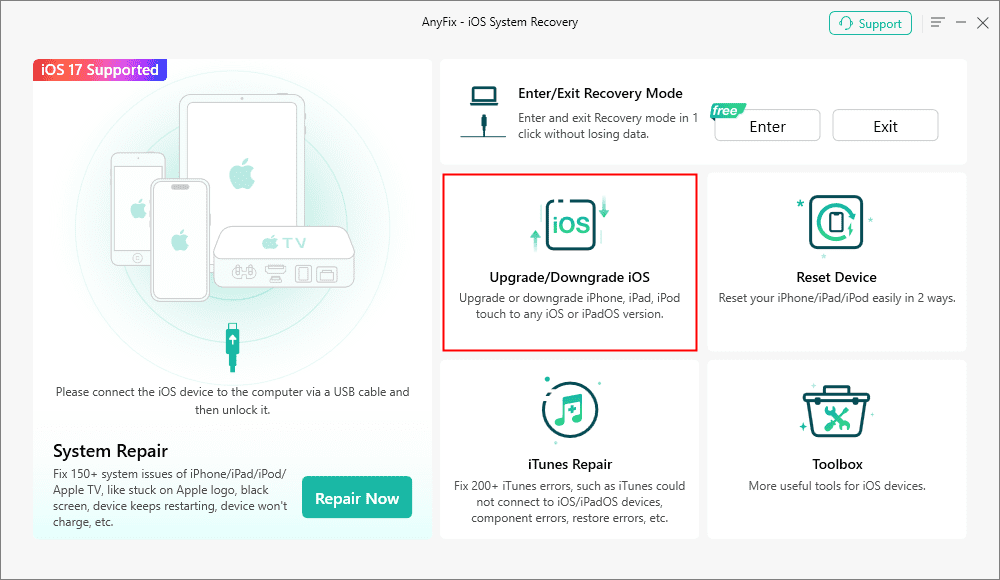
AnyFix Upgrade/Downgrade iOS Option
Step 2. Connect your device to a computer using a USB cable. Then, choose the “1 click to upgrade iOS/iPadOS” option and click “Start Now.”
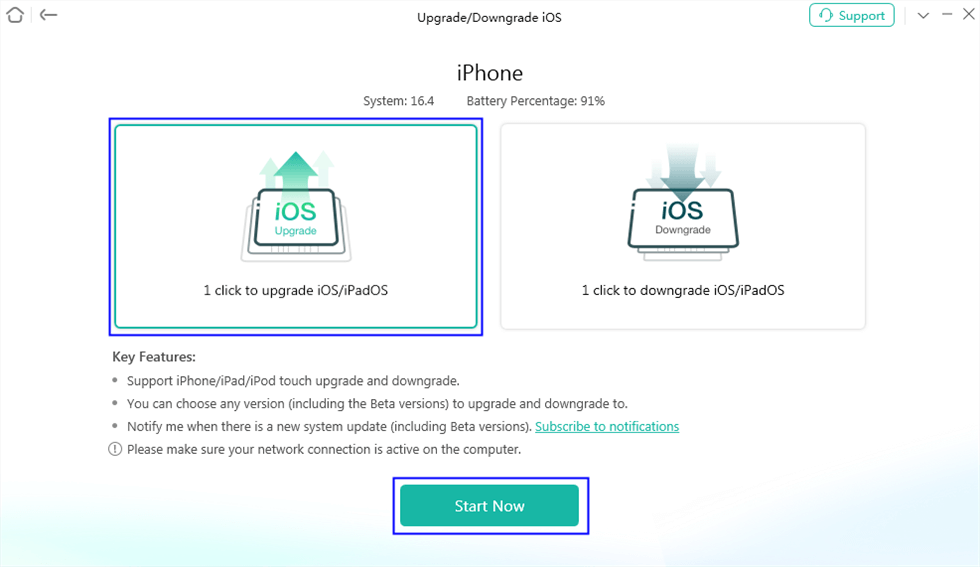
Start Upgrading iOS
Step 3. The next window will show all the supported iOS firmware versions. Select your desired iOS file and click “Download.”
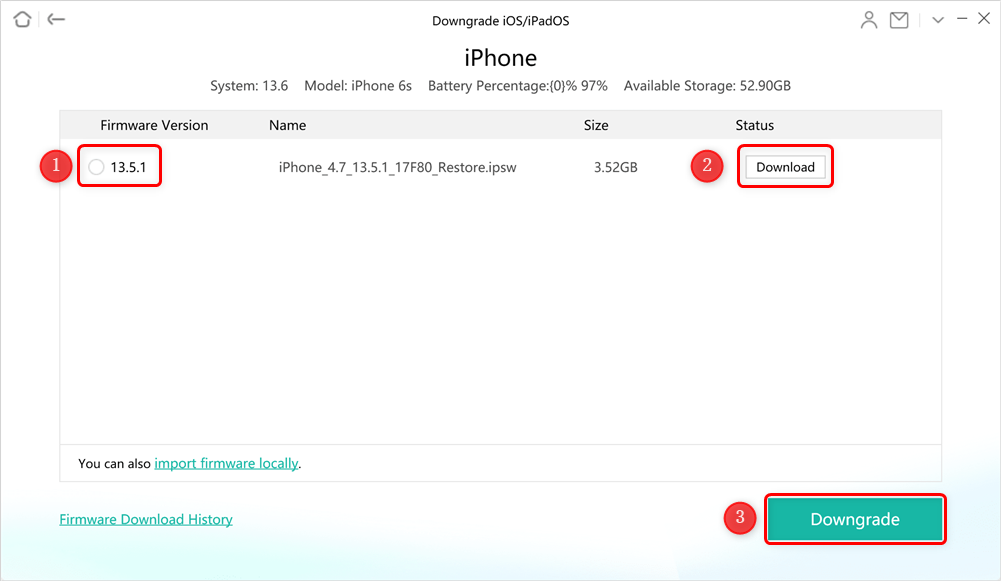
Download Firmware
Step 4. Once the download completes, click the “Upgrade” button to install the iOS version.
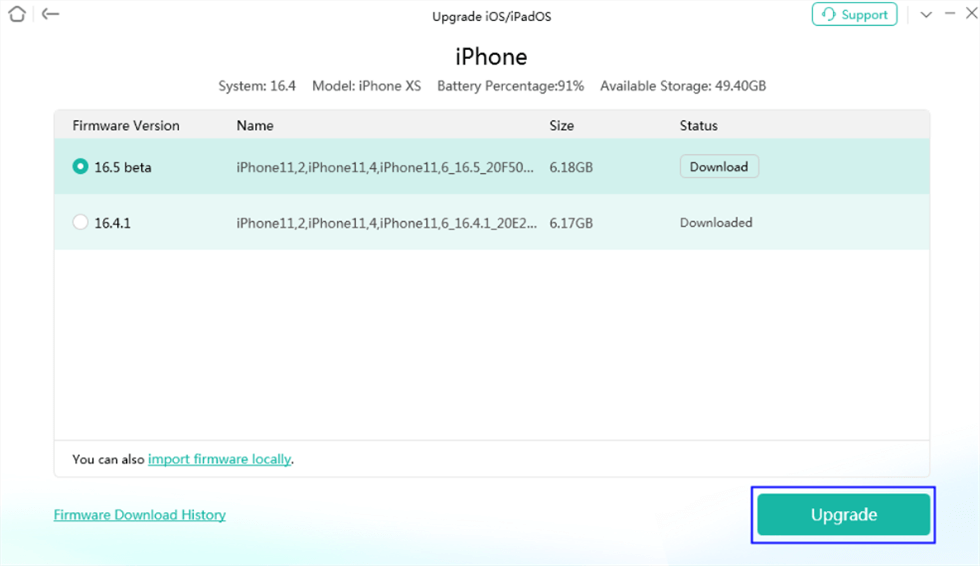
Click the Upgrade Button
Step 5. Wait for the update process to complete. Once it does, you will see the “Upgrade Completed” message on your screen.
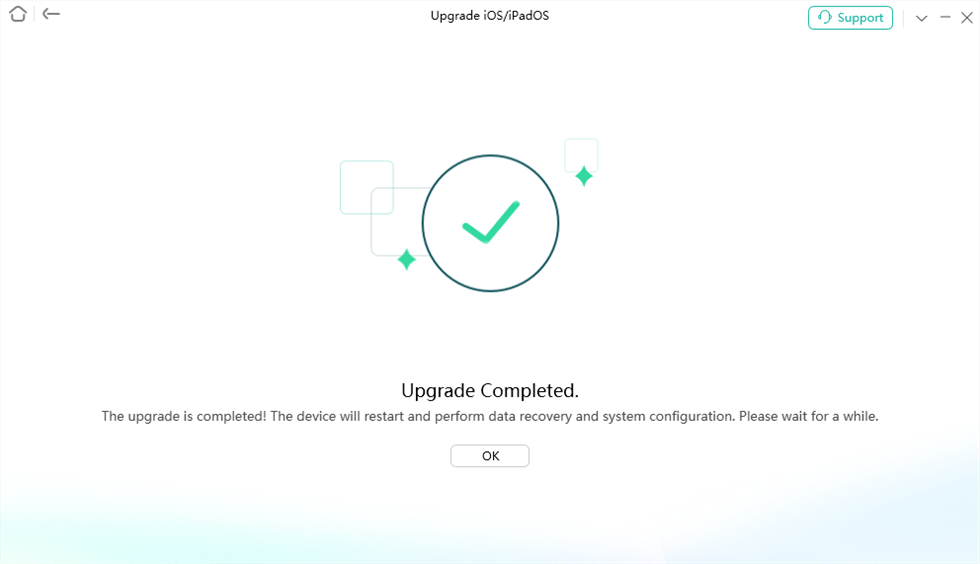
Succeed in upgrading iOS Version
That’s how to update to iOS 14 with AnyFix! The process is effortless, and you can easily update your device without any advanced skills or complex operations.
Method 2. Use Saved SHSH Blobs (Advanced Users)
You can also use the SHSH Blobs to update to iOS 14. These files with digital signatures allow you to update or downgrade to an unsigned iOS. You’ll need the following resources to upgrade your device using this method:
- The unsigned iOS 14 IPSW file
- The blobs file of the iOS 14 firmware
- Latest version of FutureRestore
Note: You must have saved a blob file of iOS14 while Apple still signed it. Otherwise, you won’t be able to restore the firmware.
Here’s how to update to iOS 14 using this method.
Step 1. Connect your iPhone to your computer. Open iTunes and click the iPhone icon at the top.
Step 2. Click the Serial number until the ECID number is shown. Copy it.
Step 3. Go to the TSS Saver website. Enter your ECID and choose your iPhone model. Then click “Submit” and download the generated Blob file.
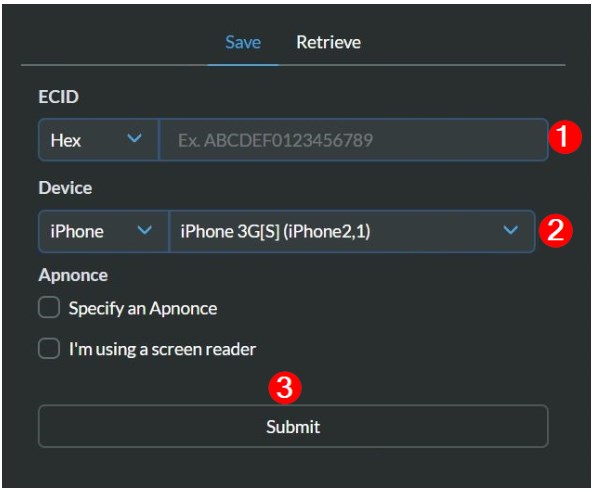
steps to generate blobs file
Step 4. Place all three required items in one folder. Then, open Terminal (Mac) or Command Prompt (Windows).
Step 5. Drag the unarchived FutureRestore file into Terminal and type “-t.”
Step 6. Drag the blob file into Terminal and type –latest-sep –latest-no-baseband (for no SIM) or –latest-sep –latest-baseband (for SIM).
Step 7. Drag the unsigned iOS firmware into Terminal. Then, press “Enter” to start the upgrade.
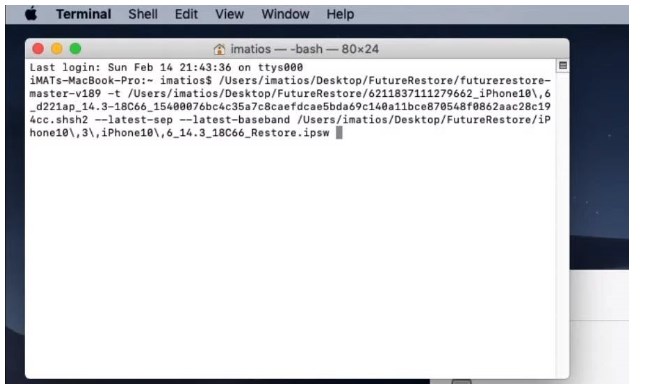
run command to start ios upgrade
That’s all. If the process fails in recovery mode, re-enter the command and try again.
Method 3. Using the Supervise Mode (Jailbroken Devices)
Another way to install iOS 14 is by using the Supervise mode on a device jailbroken with checkra1n. This allows you to download and install the custom firmware for iOS 14.
Here’s how to update to iOS 14 using this method.
Step 1. Open Safari and go to “repo.supervise.me.” Click the “Add to Cydia” package file. Install it on your device.
Step 2. Open Cydia and click “Install the Source.” Once complete, click “Return to Cydia” and tap “Continue to Source.”
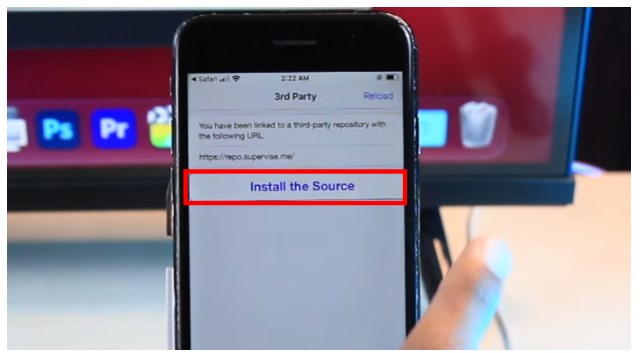
tap install the source
Step 3. Tap “Supervision” and select “Supervise” from the next screen.
Step 4. Click the “Install” button at the top. Then press “Confirm” to verify the action.
Step 5. Return to Cydia and restart the springboard. If you don’t have any application for it, tap the “Search” icon and type Flame. Then install it. Once done, click “Restart Springboard.”
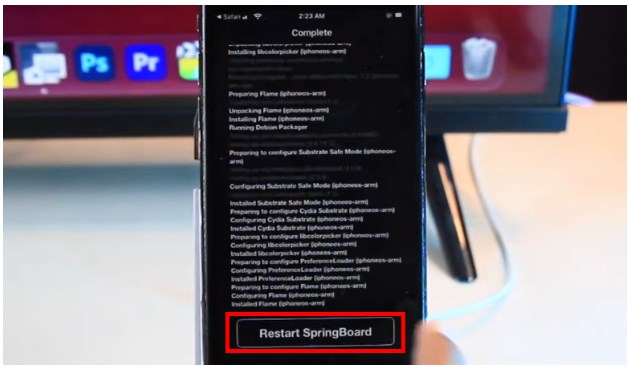
restart springboard with flame
Step 6. Open checkra1n and click “Restore System.” Wait for your phone to turn on. Then, enter the passcode to unlock your phone.
Step 7. Open Safari and go to “DelayOTA.com.” Then, download the iOS 14 version you need.
Step 8. Go to Settings and tap “Profile Downloaded > install.” Then, go to “Software Update.” You will see the option to install the iOS 14 version.
That’s how to update to iOS 14 on a jailbroken device. However, jailbreaking and installing custom firmware can brick your device, making it unusable and causing security issues. Therefore, we suggest using a reputed tool to update your device safely.
Part 4. TIP: How to Fix an iPhone that Cannot be Updated to iOS 14
Sometimes, deeper issues with the iOS software can cause random glitches and errors. These can hinder you from updating your device to a desired iOS version.
But don’t worry! AnyFix offers an easy way to tackle these issues, whether mild or complex! You can fix any update errors without technical and complex navigation.
AnyFix lets you repair your device in 3 simple steps with many benefits:
- Fix 150+ iOS system issues, including iOS update errors and more.
- Fix common update issues without data loss.
- Solve more severe problems, such as stuck on the Apple logo or failed updates.
- Restore devices frozen on black/white screens or in DFU mode.
- Easily resolve problems where the device gets stuck in recovery mode during an update.
Part 5. FAQs on How to Update to iOS 14
1. Why can’t I upgrade to iOS 14?
Apple has removed its digital signature for iOS 14. This means iOS 14 is no longer supported. You cannot install it on any device through the official means.
2. How to downgrade iOS 15 to 14
There are no official means to downgrade iOS 15 to 14. However, you can use dedicated iOS downgrade tools like AnyFix to restore your phone to any iOS version.
3. How do you update to iOS 14 if it doesn’t show up?
Apple no longer signs iOS 14. That’s why the update option does not appear. If you still want to update to iOS 14, you’ll need to use third-party tools.
4. How to update iOS 12.5 5 to 14?
Direct updates from iOS 12.5.5 to 14 are not possible on unsupported devices. If your device is supported, you will need a signed Blobs file and an iOS upgrade tool to update to iOS 14.
Part 6. The Bottom Line
That’s a wrap on how to update to iOS 14! While all the methods offer a practical solution, conventional methods have their fair share of risks. These can lead to data loss and bricking. Moreover, the lengthy technical steps can be exhaustive to follow.
AnyFix simplifies this process, offering a safe and reliable solution. With one-click update and system repair features, you can upgrade your device without risks associated with manual methods.
Free Download * 100% Clean & Safe
Product-related questions? Contact Our Support Team to Get Quick Solution >

